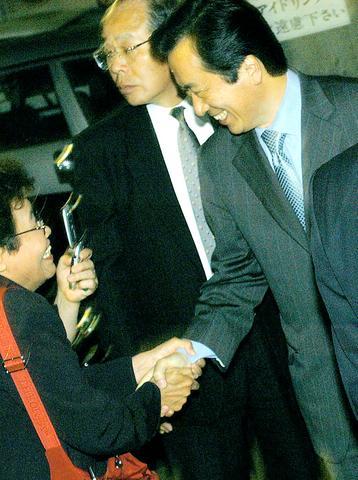The head of Japan's biggest opposition party resigned yesterday as his wounded party struggled to repair its image ahead of a parliamentary election just two months away.
Calls for Democratic Party chief Naoto Kan to step down from the top post had mounted since he admitted late last month that he -- like seven members of Prime Minister Junichiro Koizumi's cabinet -- had skipped payments into the state pension scheme.

PHOTO: EPA
"My failure to pay into the pension system increased mistrust and created huge headaches for the public and for members of our party, and for that my responsibility is huge," Kan told a meeting of Democratic Party members of parliament.
"So, in front of all of you, I want to take responsibility and resign as party leader," said Kan, a once-popular grassroots activist whose image has long suffered by comparison with the more telegenic, politically adept Koizumi.
Reform of the pension system, straining under the burden of Japan's rapidly ageing population, has been a hot topic of debate ahead of elections for parliament's Upper House in July.
Media surveys had showed a hefty majority of voters felt Kan should resign, especially since top government spokesman Yasuo Fukuda, one of the most powerful members of Koizumi's cabinet, had quit on Friday after making a similar confession.
Attention had already shifted to Kan's successor even before his announcement that he was stepping down.
Media have floated the party's number two, veteran lawmaker Ichiro Ozawa, as a candidate along with Democratic Secretary-General Katsuya Okada, a soft-spoken former bureaucrat.
Analysts say it is almost impossible for Koizumi's Liberal Democratic Party (LDP) and its coalition partner to lose their majority in the Upper House in that election.
But a poor showing for the LDP itself would weaken Koizumi's clout in his fourth and probably final year in office, and a rejuvenated Democratic Party would pose a bigger threat.
Kan, who had harshly criticized Koizumi cabinet members for failing to make pension payments, came under fire within his own party after admitting he had been similarly remiss for 10 months when he was health minister in 1996.
The pressure mounted after Fukuda's surprise resignation.
The Democratic leader's departure could put the spotlight back on the other six members of Koizumi's cabinet -- including Finance Minister Sadakazu Tanigaki and Economics Minister Heizo Takenaka -- who have admitted skipping pension payments.
His resignation, however, may not end his party's woes.
The Democrats boosted their presence in an election for the powerful Lower House last November, but suffered a setback when they lost all three by-elections held last month.
How Ozawa, 61, would be received by voters is as yet unclear.
Once a ruling party heavyweight, he quit the conservative Liberal Democratic Party in 1993, setting off a chain reaction that ended its four-decade rule, albeit briefly.
Admired by some as a forceful advocate of reform, he has also been criticized as a Machiavellian backroom wheeler-dealer.

Asian perspectives of the US have shifted from a country once perceived as a force of “moral legitimacy” to something akin to “a landlord seeking rent,” Singaporean Minister for Defence Ng Eng Hen (黃永宏) said on the sidelines of an international security meeting. Ng said in a round-table discussion at the Munich Security Conference in Germany that assumptions undertaken in the years after the end of World War II have fundamentally changed. One example is that from the time of former US president John F. Kennedy’s inaugural address more than 60 years ago, the image of the US was of a country

‘UNUSUAL EVENT’: The Australian defense minister said that the Chinese navy task group was entitled to be where it was, but Australia would be watching it closely The Australian and New Zealand militaries were monitoring three Chinese warships moving unusually far south along Australia’s east coast on an unknown mission, officials said yesterday. The Australian government a week ago said that the warships had traveled through Southeast Asia and the Coral Sea, and were approaching northeast Australia. Australian Minister for Defence Richard Marles yesterday said that the Chinese ships — the Hengyang naval frigate, the Zunyi cruiser and the Weishanhu replenishment vessel — were “off the east coast of Australia.” Defense officials did not respond to a request for comment on a Financial Times report that the task group from

BLIND COST CUTTING: A DOGE push to lay off 2,000 energy department workers resulted in hundreds of staff at a nuclear security agency being fired — then ‘unfired’ US President Donald Trump’s administration has halted the firings of hundreds of federal employees who were tasked with working on the nation’s nuclear weapons programs, in an about-face that has left workers confused and experts cautioning that the Department of Government Efficiency’s (DOGE’s) blind cost cutting would put communities at risk. Three US officials who spoke to The Associated Press said up to 350 employees at the National Nuclear Security Administration (NNSA) were abruptly laid off late on Thursday, with some losing access to e-mail before they’d learned they were fired, only to try to enter their offices on Friday morning

STEADFAST DART: The six-week exercise, which involves about 10,000 troops from nine nations, focuses on rapid deployment scenarios and multidomain operations NATO is testing its ability to rapidly deploy across eastern Europe — without direct US assistance — as Washington shifts its approach toward European defense and the war in Ukraine. The six-week Steadfast Dart 2025 exercises across Bulgaria, Romania and Greece are taking place as Russia’s invasion of Ukraine approaches the three-year mark. They involve about 10,000 troops from nine nations and represent the largest NATO operation planned this year. The US absence from the exercises comes as European nations scramble to build greater military self-sufficiency over their concerns about the commitment of US President Donald Trump’s administration to common defense and